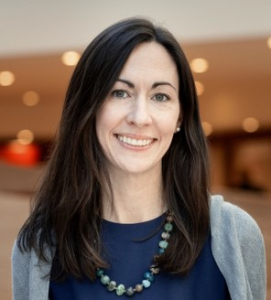
By: Office of Sustainability Initiatives
When the COVID-19 pandemic reached Georgia and healthcare facilities rapidly developed protocols and procedures for providing care in the new era of coronavirus, Emory’s medical students were pulled out of rotations in hospitals and clinics to shelter in place at home. Students were left pondering a world where global pandemics, social and environmental determinants of health, disaster preparedness, and the ability to mitigate risks to exposures are all connected to the health of patients, their families, and their communities. They also needed electives that could be implemented virtually, and soon.
Rebecca Philipsborn (‘13M), assistant professor of pediatrics and primary care pediatrician at Emory and Children’s Healthcare of Atlanta, was catching up with 3rd year medical students Ben Rabin and Emaline Laney when she realized this need. Dr. Philipsborn reached out to friends and colleagues across the country to gauge interest in providing content for a “Climate Crisis and Clinical Medicine M3 & M4 Virtual Elective” for third- and fourth-year medical students. “Because of the virtual format, we had an opportunity to leverage collective expertise from around the country and create a course that medical students anywhere could access,” said Dr. Philipsborn. The topic was especially resonant during COVID-19. “Even though many of my colleagues have been strained in caring for patients with coronavirus, the response was overwhelmingly positive and so generous.” Dr. Philipsborn quickly compiled a 4-week course that covers Climate Change and Emerging Clinical Challenges, Health Equity and Social Justice, Climate Solutions for the Healthcare Sector, and Communicating about Climate Change.
As illustrated in the course description,
“Today’s medical students will be on the front lines of clinical medicine in the Anthropocene, the geologic era marked by human activity and climate change. Climate-driven exposures harm patients and increasingly intense natural disasters disrupt healthcare delivery. At the same time, many of the actions needed to address climate change – to reduce carbon emissions and transition to a more sustainable future — also benefit health.”
By the end of the course’s 17 lectures, students will have heard from climate and health experts from around the country about recognizing, managing, and mitigating the many-faceted consequences of climate change for health and healthcare delivery that they will face in their practice. Not surprisingly, interest in the elective was so high that Dr. Philipsborn opened the live lectures—in addition to the recordings — to other students around the country. More than 200 students from more than 30 institutions registered.
This elective for third and fourth year students is just a small piece of the ongoing efforts to teach future physicians about the climate-related health challenges that they will see in their practice. In 2018, Dr. Philipsborn implemented a climate curriculum for Pediatric Global Health Track Residents after participating in Emory’s Piedmont Project faculty development program. Since then, she and Lisa Thompson, a faculty member in the School of Nursing and fellow Piedmont Project alum, have been collaborating on inter-professional climate and health education.
Dr. Philipsborn was also already working with Emory students Ben Rabin and Emaline Laney who are leading integration of climate and health content for medical students. Rabin says, “As first-year students, we had lectures in climate-affected disease processes like asthma and diarrheal infections, but most lecturers weren’t making the link explicit for students. Emaline and I felt a minute or two in each relevant lecture throughout the pre-clinical curriculum would help future students understand specifically how our environment impacts health. And hopefully they could take that foundation in climate and health science into their clinical years as they began to see patients.”
Rabin and Laney reviewed the medical curriculum lecture by lecture to find high-yield opportunities to link climate change to pathophysiological principles emphasized in the first two years of medical education. Teaming up with Dr. Philipsborn, Rabin and Laney gained approval from Emory’s curriculum committee to move forward in integrating this content starting for the class of 2024. Laney says, “Climate change will undoubtedly affect our clinical practice as it will be—and is—the health of our patients. Having a foundational knowledge of the link between the environment and health is key in preparing us to engage in this topic as future healthcare providers—be it to address the healthcare sector’s own carbon footprint, emerging infectious diseases, or the disparities within our communities that risk augmentation in the face of the climate crisis.”
Students will eventually be back in the halls of hospitals and clinics, learning on the front lines. While coronavirus may pervade their clinical years of medical school, the climate crisis is likely to shape the landscape of medicine and healthcare delivery throughout their careers. Students of the climate crisis and clinical medicine elective will be better prepared to care for patients and practice medicine in this changing climate.
For more information and to access the virtual elective course content, visit Emory’s Office of Sustainability website or reach out to Dr. Philipsborn.

This initiative from the Emory Office of Sustainability Initiatives is truly commendable. In the midst of the COVID-19 pandemic, the adaptability and foresight to create a “Climate Crisis and Clinical Medicine M3 & M4 Virtual Elective” for medical students, addressing the interconnectedness of health, climate, and social factors, reflect a commitment to holistic medical education. Kudos to Dr. Rebecca Philipsborn and her collaborators for leveraging collective expertise and fostering awareness about the critical intersection of climate change and healthcare. This initiative not only equips future healthcare professionals with a broader perspective but also highlights the importance of addressing environmental challenges in the context of medical practice. Well done, Emory!
We agree! Dr. Philipsborn inspires us all!